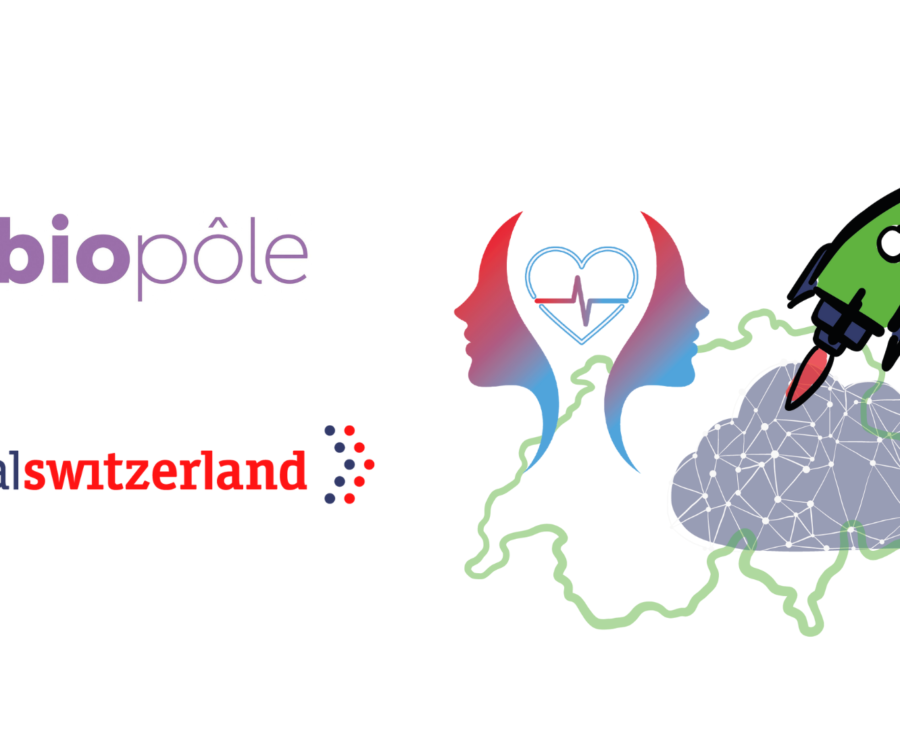In mid-October 2023, digitalswitzerland hosted the second webinar of its Community Talks. This session delved into the crucial topic of data interoperability in healthcare, featuring three panellists representing organisations from digitalswitzerland’s Swiss Patient Journey Ecosystem Map: Oksana Bober, Co-Founder and CEO of iCure, Serge Bignens, President of MIDATA and Head of the Institute for Medical Informatics at the University of Applied Sciences Bern and Gilles Lunzenfichter, Co-Founder and CEO of Medisanté.
digitalswitzerland is committed to digitalising the entire Swiss healthcare system, placing the patient at the centre of the transformation. The Ecosystem Map serves as a guide, illustrating digital solutions in Switzerland dedicated to the patient journey and healthcare system. The map is segmented into five categories and our webinar focused on one of these categories, «data interoperability».
During the discussion, the panellists explored the challenges and potential solutions related to achieving data interoperability in healthcare.
The importance of data interoperability in healthcare cannot be stressed enough. It has the potential to significantly enhance patient care and coordination among healthcare providers. When data becomes interoperable, this supports medical research, ensures regulatory compliance, and reduces costs, all while empowering patients to have greater control over their health information. Data interoperability is a critical element in the modernisation and optimisation of healthcare systems.
For Gilles Lunzenfichter data interoperability is achieved when «data flows like a river, seamlessly and securely from source to an intended destination». This involves the capacity to reuse data within a single system for various purposes and to transfer it between different platforms. Oksana Bober emphasised that «achieving medical data interoperability is a joint effort that encompasses technology as the foundational layer; regulatory aspects, risk management, and organisational adoption and change management as subsequent layers».
The panellists discussed challenges related to standardisation efforts and reimbursement issues. They concurred that while standards exist, many solutions tend to customise these standards, complicating efforts to achieve interoperability. Moreover, the costs of implementing data interoperability often fall on parties that do not directly benefit from it. The primary beneficiaries tend to be downstream entities, leaving little to no incentives for those implementing interoperability. An example might be that the IT department of a hospital needs to invest to streamline its digital infrastructure. In the long run, it is mainly the patients or the doctors who will benefit from this investment, as the data will be better structured.
To move forward and realise data interoperability, it must be considered as a collaborative effort across the ecosystem. Incentivisation is a key factor for faster adoption and efforts should focus on rewarding pioneers who take initiative. Community-based business models and incentives should be developed and promoted. «It’s essential to transition from isolated pilot projects to broader-scale initiatives», Gilles Lunzenfichter states, drawing inspiration from successful use cases in countries like Belgium, Sweden, Germany, France and the US, where incentivisation techniques have been effective. For instance, in Belgium, doctors who share data from their devices with the national eHealth system receive financial rewards. In general, a collective vision should unite all IT stakeholders, extending beyond data interoperability, recognising it as just one aspect of the whole healthcare experience.
To conclude the discussion, the panellists shared their visions for the Swiss healthcare system in 2050:
- Gilles Lunzenfichter found that «the hospital of the future is the hospital at home – it’s inevitable». He envisions remote patient monitoring through the use of IoT as the future of healthcare.
- Oksana Bober’s vision centres on expediting healthcare delivery to patients by using incentivisation methods that equally motivate various stakeholders.
- Serge Bignens stressed the «need for better financial recognition and incentives for coordination of care as a driving force behind interoperability adoption in healthcare or a push for mandatory Application Programming Interfaces (APIs)».
In summary, achieving data interoperability in healthcare holds immense potential for improving patient care and the healthcare ecosystem as a whole. To realise this, it’s crucial to address challenges, incentivise stakeholders, and work together to build a healthcare system that is patient-centric and data-driven.

- Serge Bignens, President of MIDATA and Head of the Institute for Medical Informatics at the University of Applied Sciences Bern. MIDATA Cooperative specialises in health data management and has developed a governance model and IT platform giving citizens full control on the management and reuse of their personal data in anonymized or pseudonymized form.
- Oksana Bober, Co-Founder and CEO of iCure. iCure provides out of the box back-end solutions for medical records and patient data, so that Electronic Health Records and Medical Devices companies specialising in electronic medical records, outpatient monitoring, digital therapeutics and HCP-patient interaction can build secure, compliant and interoperable software faster and with lower risks.
- Gilles Lunzenfichter, Co-Founder and CEO of Medisanté. Medisanté offers medical IoT data as a service, abstracting a wide array of provisioned devices requiring no configuration by the patient at home in a single cloud infrastructure platform.






